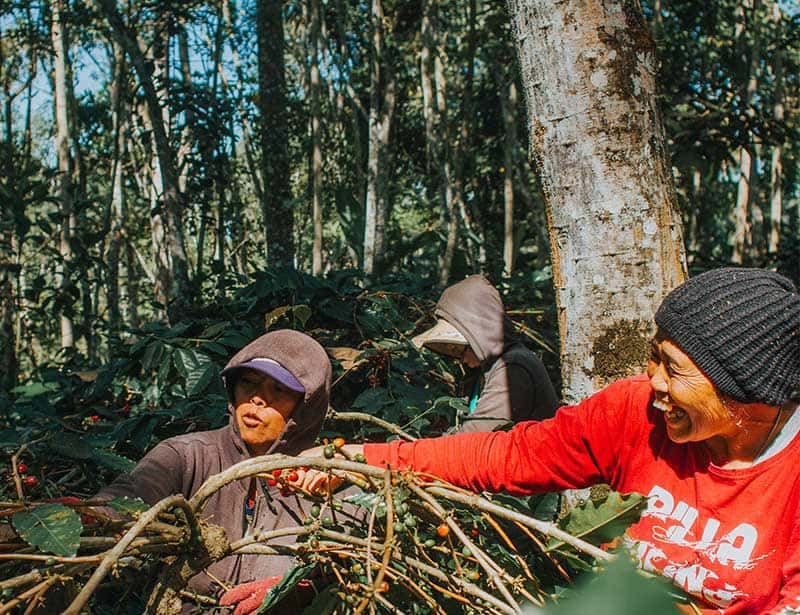International Coffee Day: Raising Awareness & How to Celebrate
Every October 1st, we greet the day with a hearty cheer for coffee. This isn't just any day; it's International Coffee Day. Born in Milan, this day carries a weight beyond the caffeine buzz it celebrates. It's a heartfelt "thank you" to the tireless coffee growers around the globe.
But there's more to International Coffee Day than just clinking coffee cups. Imagine the journey of your morning coffee, from the fragrant coffee farms to your kitchen table, a story woven from long days, hard work, and a love of the bean that often goes unnoticed. On International Coffee Day, we honor that story.
International Coffee Day also advocates for sustainable coffee farming, fair trade, and eco-friendly practices. This day stirs a global conversation around ethical coffee consumption, pushing for growers' rights and the health of our environment.
It's about knowing where our coffee comes from and standing up for conscious consumerism in every steamy, aromatic cup.
Featured in: October - Awareness Months, Days & Observances.
International Coffee Day History and Background

The origins of International Coffee Day can be traced back to the early 1980s when The All Japan Coffee Association held an event in Japan. In 1997, the International Coffee Organization in China also celebrated its own version of coffee day.
Meanwhile, International Coffee Day has its roots in the 2015 initiative of the International Coffee Organization (ICO). The ICO, a pivotal entity in the global coffee sector since 1963, chose this day to extol coffee as a beverage and draw attention to fair trade in the coffee industry.
The first-ever celebration had over 35 countries hosting official events. The ICO has given the day a unique theme each subsequent year, highlighting different aspects of the coffee industry. For example, the 2020 theme, "Coffee's Next Generation," underscored the importance of supporting the industry's future torchbearers. While in 2022, it focused on “The Circular Coffee Economy.”
Numerous countries have their own national Coffee Days that take place on various dates throughout the year. Germany, for instance, established Tag Des Kaffees in 2006 and marks the occasion every year on the first Saturday of September. Meanwhile, in the United States, the holiday known as National Coffee Day is held on September 29, sometimes referred to simply as Coffee Day.
However, regardless of the date, it's common to find public tastings, edge-of-the-seat barista competitions, and enlightening seminars celebrating the inky black brew.
The Cause and Its Challenges

Your cup of morning coffee? It's more than just a beverage and welcome pick-me-up. It's also the story of graft, perseverance, and unseen challenges. International Coffee Day urges us to turn our attention to these tales, particularly those lived by coffee growers.
You see, small farmers in the developing world nurture most of our beloved beans, where they face a risky business. Their income pegged to the global coffee prices, sways like a boat in a storm. Imagine planning your life when coffee prices can dive from $1.18 per pound in 2015 to just $0.93 in 2019, as the International Coffee Organization reported. It's a challenging ride.
Up ahead, climate change looms. Traditional coffee-growing areas are fading4, their soil losing its magic. Warnings from the Intergovernmental Panel on Climate Change paint a grim picture; by 2050, half of the current coffee lands might be infertile. This isn't some distant, murky future. The 25 million farmers who bank on coffee already feel it's a challenge, as per World Bank data.
Similarly, child labor, cited by the U.S. Department of Labor in 14 coffee-producing countries, taints our morning brew. And then, there's the gender divide. Though women shoulder a hefty share of the work on coffee farms, they usually find themselves pushed to the fringes. They are often denied access to resources and seats at decision-making tables.
So, as you sip your brew on this day, remember the journey it likely took from a humble coffee farm to your cup. It's a day to appreciate every cup's journey and the hands that made it possible.
Read more: Coffee - Environmental Impact of our Caffeine Habit.
5 Reasons to Celebrate International Coffee Day

Beyond celebrating the caffeinated brew and coffee drinking we hold so dear, many aspects of the coffee trade are worth recognizing and addressing on World Coffee Day:
- Imagine waking up each day to cultivate the crop that shapes the livelihood of over 125 million people worldwide. That's the reality for coffee farmers, predominantly residing in developing countries. For them, the income from this humble bean isn't just money—it's the lifeblood of their families and communities.
- In coffee production, rising global temperatures, unpredictable rain patterns, and a surge in pests and diseases are causing disarray. The result? A significant shake-up in both the yield and quality of coffee beans2.
- More than just a buzzword, Fair Trade is a lifeline in coffee circles. It ensures those who sweat and strain in the fields aren't short-changed for their labor. It also encourages the adoption of sustainable farming practices, creating a positive effect on our environment.
- However, in their quest for expansion, many coffee farmers clear forests to make way for new coffee trees1. This disrupts local ecosystems, slashes biodiversity, and, ironically, contributes to the very climate change threatening their crops.
- Then there's the issue of pesticides. Frequently employed in coffee cultivation, these chemicals pose a significant risk to both the environment and the farmers. Organic coffee farming, though, stands tall as a solution. It ditches these harmful chemicals, offering a greener path to our beloved morning cup of joe.
Read more: 17 Best Fair Trade Coffee Brands for Ethical Caffeine Fixes.
Efforts and Initiatives
Many organizations worldwide, from corporations to grassroots initiators, are championing the cause of eco-friendly coffee farming. Take the International Coffee Organization (ICO), for instance. Since their kick-off of the inaugural International Coffee Day, they've been amplifying the unheard stories of coffee growers. Their mission? To spotlight how choosing fair trade coffee can transform the lives of coffee farmers at the ground level3.
Another advocate, the Rainforest Alliance, doesn’t merely support eco-friendly ideals; they're teaching them. By offering hands-on training in sustainable farming methods, they're helping coffee farmers achieve certification and produce coffee that's not just delicious but responsible too.
Of course, corporate giants are making their mark too. Starbucks, in particular, is stepping up with a meticulous approach to ethical sourcing. Through a network of Farmer Support Centers, they're equipping coffee growers with the tools and know-how to enhance their yield quality while cutting expenses.
Pair this with World Coffee Research's mission to shield coffee quality and safeguard farmers' incomes, and you see a compelling story of collaboration. It's proof that corporations and organizations can stir up real change in the coffee industry when they join forces.
How to Get Involved

Just imagine it - you're curled up with a steaming cup of coffee. But do you know the tale behind every sip? Dive into the journey of your coffee beans, from farm to cup, this International Coffee Day.
As you unravel the layers, you'll start seeing the bigger picture - the blood, sweat, and tears of countless farmers, the craft of skilled baristas. Why not quench your thirst for knowledge at a local coffee workshop or even a farm visit?
Now that you're armed with all this rich knowledge, why keep it to yourself? Spread the aroma of awareness, starting with people around you. Use your social media handles to stir things up a bit. And feel free to share some of our coffee quotes.
A post about sustainable coffee farming here, a shout-out for fair trade there, or perhaps just a snap enjoying a brew. All of these do their bit to raise awareness about the challenges this day recognizes and amplifies.
Volunteering with organizations focused on fair trade and sustainable coffee farming might also be your cup of tea—or, rather, coffee. The smell of freshly ground coffee will be much sweeter when you know you've pitched in to make a difference.
Feeling a bit adventurous? How about organizing a fundraiser? Sounds like fun, right? A charity run, a coffee-tasting event, or something quirky like a recycled coffee ground art competition? You'd be surprised at the number of coffee lovers who turn up, ready to lend their support.
Ways to Celebrate Coffee on International Coffee Day

Of course, this day isn’t just about the cause; it's also a great day to celebrate one of the World’s favorite hot drinks.
- Host a coffee-tasting party and explore the flavors of different coffees worldwide.
- Support local coffee houses and learn about their craft while enjoying a cup of delicious coffee.
- Experiment with brewed coffee techniques like pour-over or French press for a new coffee experience. Your local coffee shop might be hosting sessions on this day (and others)
- Share your coffee culture on social media with #InternationalCoffeeDay and #CoffeeLovers.
- Share how to brew and drink zero-waste coffee without all the plastic pods and single-use jars and bags.
- Grab yourself, or gift a friend, a reusable coffee cup because they’re far better for the planet than all those plastic-lined paper cups.
- Choose fair trade coffee to support farmers and promote sustainability.
- Discover the environmental impact of coffee production and make informed choices.
- And don’t forget to compost your coffee grounds - they’re good for the garden!
Conclusion
International Coffee Day falls on the first of October every year and is more than a celebration; it's an exploration. Every aromatic sip of coffee we savor stems from a journey that each coffee bean navigates before becoming a part of our daily rituals. Imagine the tireless hands of farmers, the ecosystems delicately balancing biodiversity, and the intricate processes working harmoniously to create your beloved brew.
This global observance champions fair trade, sustainability and an urgent call for supporting an industry that fuels our day breaks, drives our productivity, and bridges cultural divides with its universal appeal.
Because each coffee bean narrates a tale of fair trade, resilience, and hope, and as coffee enthusiasts, it's up to us to ensure the story continues to be told.
International Coffee Day FAQs
International Coffee Day is a global celebration held on October 1st each year to promote and raise awareness about the coffee industry and its impact on the global economy and environment.
International Coffee Day was first celebrated in 2015, initiated by the International Coffee Organization (ICO) to recognize the efforts of coffee growers, traders, and consumers worldwide.
The coffee industry faces various challenges, including climate change, deforestation, pests and diseases, and fair trade practices. These factors can affect coffee production, quality, and sustainability.
Sustainable practices in the coffee industry include shade-grown coffee farming, organic and fair trade certifications, water conservation methods, and supporting farmers' livelihoods through direct trade or cooperatives.
You can support the coffee industry by buying coffee from sustainable and fair trade sources, choosing certified organic coffee, reducing waste by using reusable coffee cups, and educating others about the importance of sustainable coffee practices.
| 1 |
Treanor, N. B., & Saunders, J. (2021). Tackling (Illegal) Deforestation in Coffee Supply Chains: What Impact Can Demand-Side Regulations Have (pdf). Forest Policy Trade and Finance Initiative Report. |
| 2 |
Bunn, Christian & Laderach, Peter & Ovalle Rivera, Oriana & Kirschke, Dieter. (2014). A bitter cup: climate change profile of global production of Arabica and Robusta coffee. Climatic Change. 129. 10.1007/s10584-014-1306-x. |
| 3 |
Fort, Ricardo. (2012). The Impact of Fair Trade Certification for Coffee Farmers in Peru. World Development - WORLD DEVELOP. 40. 10.1016/j.worlddev.2011.07.030. |
| 4 |
Panhuysen, S. and Pierrot, J. (2020): Coffee Barometer 2020 (pdf). |

